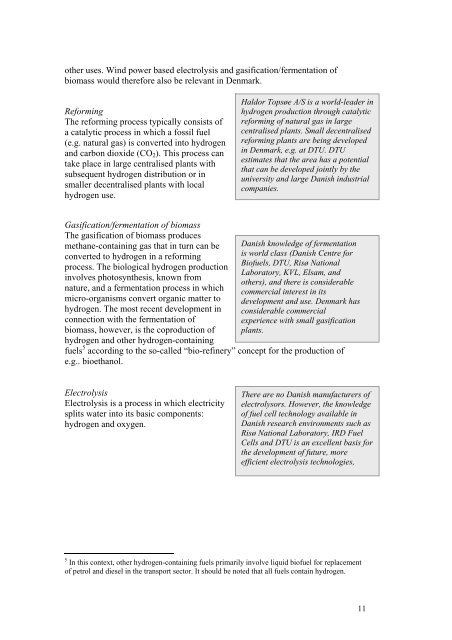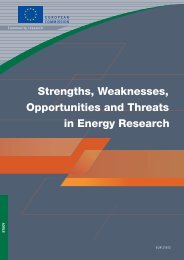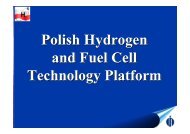Danish Strategy for Hydrogen and Fuel Cells - HY-CO Home
Danish Strategy for Hydrogen and Fuel Cells - HY-CO Home
Danish Strategy for Hydrogen and Fuel Cells - HY-CO Home
You also want an ePaper? Increase the reach of your titles
YUMPU automatically turns print PDFs into web optimized ePapers that Google loves.
other uses. Wind power based electrolysis <strong>and</strong> gasification/fermentation of<br />
biomass would there<strong>for</strong>e also be relevant in Denmark.<br />
Re<strong>for</strong>ming<br />
The re<strong>for</strong>ming process typically consists of<br />
a catalytic process in which a fossil fuel<br />
(e.g. natural gas) is converted into hydrogen<br />
<strong>and</strong> carbon dioxide (<strong>CO</strong> 2 ). This process can<br />
take place in large centralised plants with<br />
subsequent hydrogen distribution or in<br />
smaller decentralised plants with local<br />
hydrogen use.<br />
Haldor Topsøe A/S is a world-leader in<br />
hydrogen production through catalytic<br />
re<strong>for</strong>ming of natural gas in large<br />
centralised plants. Small decentralised<br />
re<strong>for</strong>ming plants are being developed<br />
in Denmark, e.g. at DTU. DTU<br />
estimates that the area has a potential<br />
that can be developed jointly by the<br />
university <strong>and</strong> large <strong>Danish</strong> industrial<br />
companies.<br />
Gasification/fermentation of biomass<br />
The gasification of biomass produces<br />
methane-containing gas that in turn can be<br />
converted to hydrogen in a re<strong>for</strong>ming<br />
process. The biological hydrogen production<br />
involves photosynthesis, known from<br />
nature, <strong>and</strong> a fermentation process in which<br />
micro-organisms convert organic matter to<br />
hydrogen. The most recent development in<br />
connection with the fermentation of<br />
biomass, however, is the coproduction of<br />
hydrogen <strong>and</strong> other hydrogen-containing<br />
<strong>Danish</strong> knowledge of fermentation<br />
is world class (<strong>Danish</strong> Centre <strong>for</strong><br />
Biofuels, DTU, Risø National<br />
Laboratory, KVL, Elsam, <strong>and</strong><br />
others), <strong>and</strong> there is considerable<br />
commercial interest in its<br />
development <strong>and</strong> use. Denmark has<br />
considerable commercial<br />
experience with small gasification<br />
plants.<br />
fuels 5 according to the so-called “bio-refinery” concept <strong>for</strong> the production of<br />
e.g.. bioethanol.<br />
Electrolysis<br />
Electrolysis is a process in which electricity<br />
splits water into its basic components:<br />
hydrogen <strong>and</strong> oxygen.<br />
There are no <strong>Danish</strong> manufacturers of<br />
electrolysors. However, the knowledge<br />
of fuel cell technology available in<br />
<strong>Danish</strong> research environments such as<br />
Risø National Laboratory, IRD <strong>Fuel</strong><br />
<strong>Cells</strong> <strong>and</strong> DTU is an excellent basis <strong>for</strong><br />
the development of future, more<br />
efficient electrolysis technologies,<br />
5 In this context, other hydrogen-containing fuels primarily involve liquid biofuel <strong>for</strong> replacement<br />
of petrol <strong>and</strong> diesel in the transport sector. It should be noted that all fuels contain hydrogen.<br />
11




